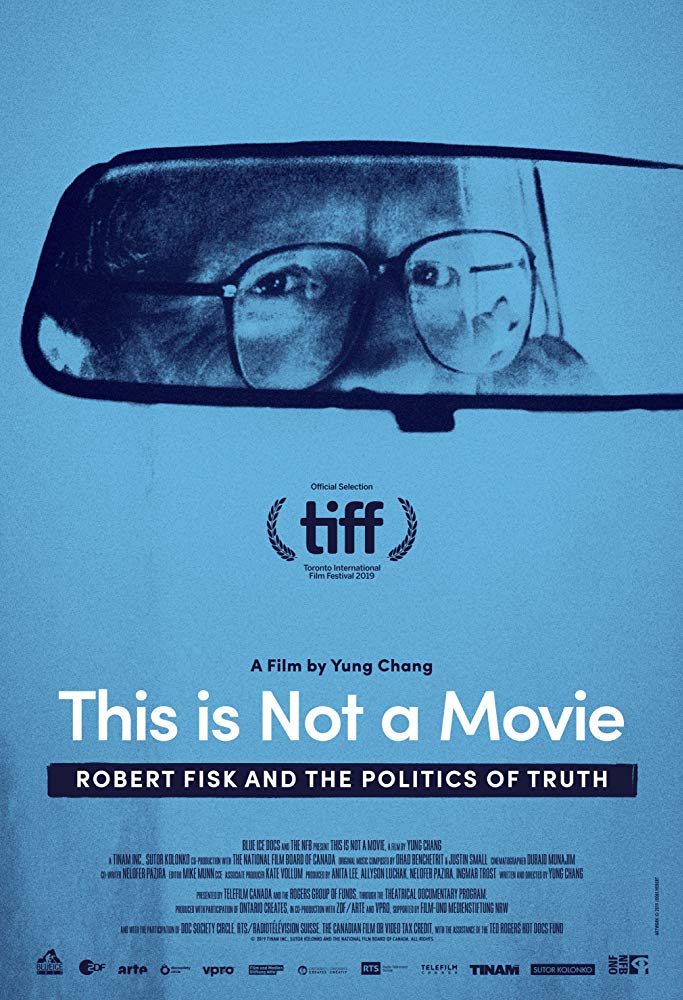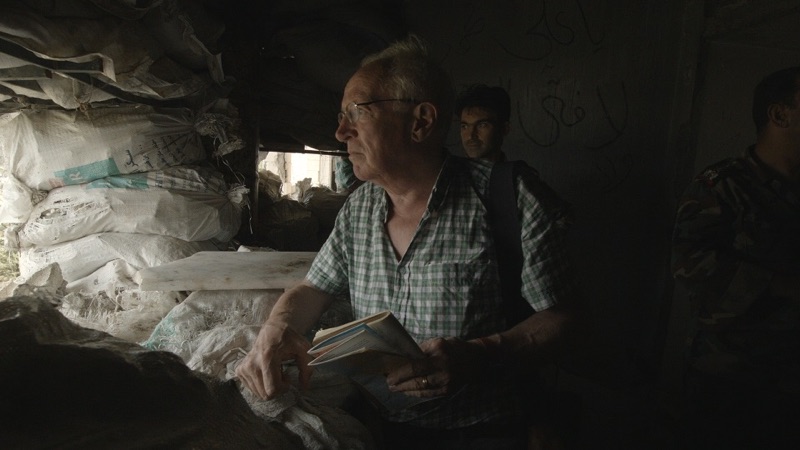You can’t believe anything on the news anymore. Campaign photos are altered for maximum effect and the truth is not always necessary for good ratings. People have been conditioned to watching the news for the impact, the conflict and the spectacular stories. At least, that’s how it seems. I am somewhat of a news buff and have noticed that there are less of the happy-ending stories in comparison to the stories of tragedy. Is it for ratings or are there really less ‘feel good stories’ in the world these days? One certainly has to wonder about how news is reported these days. I remember a time when you never had to question what was being reported. There was Walter Cronkite, Diane Sawyer and of course, the legendary Robert Fisk.
This is Not a Movie is the latest film by Yung Chang that documents the life of Robert Fisk and the man behind the story. Known for his remarkable tenacity and pledge to tell the truth with every testimony, he has built an impeccable reputation for reporting on tragedy, the suffering and the carnage that some Foreign Correspondents would rather not touch or entertain. He never stifles for uncovering the facts and his detective nose always reveals more than meets the eye.
Yung Chang is an accomplished documentary filmmaker, known for Up the Yangtze, Gatekeeper, China Heavyweight and The Fruit Hunters. Although Yung has made many award winning documentaries, he doesn’t want to be pigeonholed from making dramatic or fictional films. His latest film, This is Not a Movie premiered at the Toronto International Film Festival recently. I had the great privilege of talking to him about the film and about his future aspirations.
“What compelled you to make the documentary on Foreign Correspondent Robert Fisk?”
“I think I wanted to know his thoughts on journalism. We’re at a time and place where media literacy is at a crucial turning point in terms of how the public engages with information and everything is in question between what is fake news and what is not. Robert Fisk is legendary and a boots on the ground, Middle East Foreign Correspondent who has a lot to say about being an eyewitness reporter and journalist who sides and reports on the suffering, which is his M.O. He’s very controversial because of his stance on reporting the suffering, which can land you on many different sides of the spectrum, in terms of who is the sufferer. Right now, it’s the people in the Middle East and their suffering has been under reported. Robert brings the humanistic point-of-view of what people are going through; that is his strength. His longevity and experience in the Middle East is what makes him so important. He’s been living in Beirut, Lebanon for 40 years and therefore knows the history and the people, as opposed to other journalist’s that don’t. This is the main reason I wanted to make the film about him. It’s a look at journalism and questioning the meaning of journalism in today’s world; even the meaning of the title, Foreign Correspondent and what it means. We need them to translate from their world to our world and that’s the other point of the film. What does it mean to be a Foreign Correspondent and look at what that responsibility is, what integrity is required when reporting the truth? Robert is 74 now and in his 40 years of reporting in the Middle East is really telling in terms of how his voice is reaching people and readers and why his voice is resonating. I think it’s because of his definition of journalism.”
“Were you drawn to this story because of Robert Fisk or was it more about the subject matter?”
“For me, you can’t really explore the idea of a movie without a strong character, it goes hand in hand. It’s not a biography but more about the motivations that drive a journalist like Robert Fisk to do what he does. We went over to Bosnia to report on weapons manuals that were found by Robert in Syria in the hands of ISIS. These weapons manuals along with included documents were splined and executed by arms dealers in an arms factory in Bosnia. Robert was able to find out who those arms were sold to; which happened to be Saudi Arabia. The arms were then able to reach ISIS rebels in Syria and that’s problematic. This is about that kind of journalism and what it takes to be an investigative journalist and weed out what the truth is. The theme of the film is journalism, the reporting of journalism, questioning it and what the truth is goes hand in hand. When I make a film, the character drives the movie.”
“Did you travel there to capture much of the footage?”
“Yes we did. My camera team shot the footage in Syria and my cinematographer was Duraid Munajim (Zero Dark Thirty, Footlocker) known as the guy that shoots in the Middle East. I happened to go to film school with him in Montreal. He’s pretty fearless and shot all our footage. We went where Robert went, who has a nose for safety and danger. He’s very careful and knows what it’s like to be in war. He often talked about young journalists that would come over during the Bosnian war from America filled with romantic notions of being a Foreign Correspondent in the early 90’s and getting killed off. Robert has been through it all and although there has been a certain amount of luck, he has been very careful in everything he does.”
“What types of issues concern you these days?”
“Right now, I’m focusing on This is Not a Movie, focusing on the themes of media literacy and how to engage with the news. Differentiating between what is real and what is fake, how to build our trust back into journalism. By connecting to people like Robert Fisk is the current theme I’m working on. I don’t want to be pigeonholed as a filmmaker that makes Chinese films/Chinese documentaries, so on the horizon I’m working on a film about Hockey that happens to be in China but I‘m very curious about the story. I have a fiction film that I’ve been trying to develop for awhile now and after I’m finished the run with This is Not a Movie I’ll be back at it and hopefully it will be my first scripted film.”

“Is there anything that you’ve learned about Robert Fisk?”
“People either love him or they hate him. He has a huge following around the world for his work and writing. He also has his enemies but says he turns a blind eye to that in order to keep moving forward. Originally coming into it I was somewhat intimidated by this giant of journalism but in the end he was quite light hearted. What struck me is his likeness, he’s funny and enjoys joking around and has boundless energy. It really speaks to who he is and I don’t think I’d have the energy to do what he does. He says in the film that he doesn’t believe people that have had trauma or PTSD and he’s never had a nightmare until he covered a massacre in ’82. Underneath that exterior though, I’d say that there’s a deeply sensitive man that’s driven by an anger derived from all the wrongs he’s witnessed and that keeps him going. He has incredible conviction and integrity that is quite blunt and holds him true to his words.”
“You’ve only made one short film in the past and the rest have been documentaries. Since you’ve told me earlier that your next film will be fiction, is this an indication that you want to branch out into feature films?”
“Mostly I work in narrative documentary. They should look and feel like fiction with stories and character arcs. When I make my fictional film I think I’ll apply some of those same principals/elements. The working title is called Eggplant and in Mandarin, is the equivalent of saying cheese. I ‘d describe it as a film noir type about a woman that cons bachelors for the bride fee. She’s a grifter that gets embroiled into a con game and wants to get out. She seeks the help from an ex lover. This is a situation that actually exists in rural China because there are too many men and not enough women. This drives up the price of the bridal fee, which is what’s paid between families. Usually a matchmaker puts the deal together but the con came about through this woman and her partner. This woman is a wedding grifter that marries these desperate bachelors in the rural countryside before skipping town and taking all the money with her.”
“What do you do to unwind/relax?”
“Every time I make a movie I’m out of commission because it takes so much out of me. Making a documentary is non-stop. The amount of energy required, you’re at the mercy of your subjects and you really have no control. I have a young family now, a young daughter and I’ve got to keep working and have other projects that I want to keep pushing and making. When I unwind, it’s usually things I’d like to do. I’d like to read more and watch more movies but at the end of the day it’s spending it with my family and sipping a cold beer.”
Yung continues, “It’s been a busy summer because I had to finish the film, so I’ve been in Germany partly because it’s a co-production between Canada and Germany. I was in Cologne for three weeks working on the post. There was no time for sight-seeing; I was in the studio mixing the film or colour timing and colour grading and also a little back and forth between that and the graphic work in the film. Of course, there was some unwinding time back at the hotel and a lovely little café in Cologne. They have this beer called a Colché and similar to Champagne in Paris, you can only find the beer in Cologne. It’s a delicious light beer that they serve in a thin glass. They’ll keep refilling until you tell them to stop.”
“How does your family feel about you making films?”
“They’re supportive now but less so when I younger. I knew at a young age that I wanted to get into filmmaking, so I had to figure out how to turn them around to it. Once I made the decision to pursue it past the point of no return they did support me and I feel very lucky for it.”
“What is your opinion on the Hong Kong protest?”
“I feel like Hong Kong is a very special place and feel that what happens there is very important in defining the future of Hong Kong. I’m fearful of the echoes of Tiananmen Square in 1989. When the students are the driving force for change, I don’t think it should be overlooked. I think mainland China and the culture is amazing and I’d love to go back in a heartbeat but the problem is really dealing with government and authorities.”
Yung Chang is a remarkably talented filmmaker creating his footprint in Canadian film. His subjects might be in other countries but he always has his footing here. His knack for uncovering the stories in people and places is award winning in itself. Please take a gander at his imdb page and you will see what I mean. His first feature film Eggplant is sure to astound us all if his past films are any indication. Definitely one filmmaker that should be on everyone’s radar.

